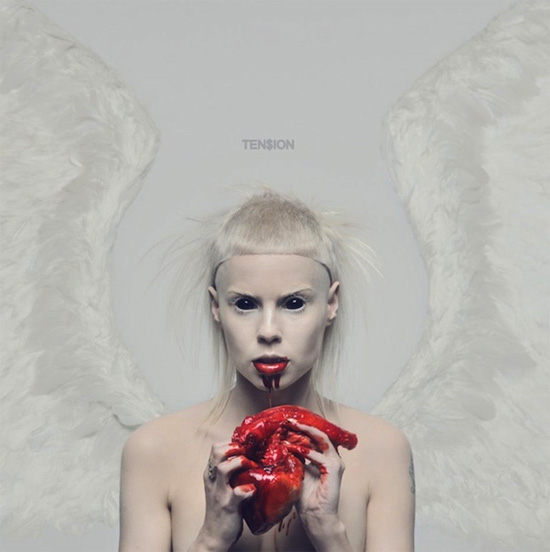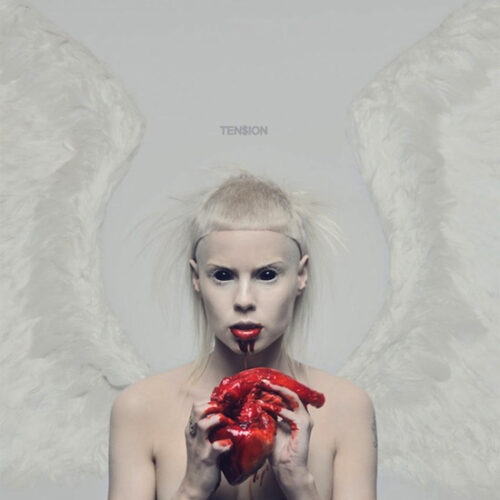Comedy rap act or conceptual art project? Whatever your opinion on rave-rappers Die Antwoord, their new album is a rare treat – South African pop music. But if a cultural insight into the country is intriguing enough, Ten$ion‘s depiction of modern South Africa is nothing less than thrilling. Though not explicitly, nor necessarily the intentions of its creators, it’s hard to shake the image of a future dystopia. Somehow, Ten$ion is sci-fi.
How? Well, it’s the result of many things. Firstly there’s the specific selection of sub-genres the album centres around. Ten$ion brings together the aggressive, non-euphoric elements of rave – militaristic power anthems (Baby’s On Fire), ramped-up electroclash (‘I Fink Your Freeky’); rigid Euro renditions of gangster rap (‘So What’) and undanceable, metallic brostep (‘Never Le Nkemise’). It’s a perfect cross-section of funkless anarcho-dance, driven by those uniquely Northern European styles that often bring to mind images of totalitarianism, and by extension sci-fi like THX 1138, Brave New World or countless other futuretopias. On the other hand, the tribal feel of ‘Hey Sexy’ and the Kuduro-esque ‘Fatty Boom Boom’ suggests the idea of plastic-fantastic technology in the context of Africa.
There’s also Ten$ion‘s resemblance to the type of music that many sci-fi directors have imagined will be in-vogue in dystopian futures – everything hard, obnoxious and amphetamine-fuelled. Think The Matrix‘s anabolic industrial, Minority Report‘s blaring VR club, the robot-rock house band playing A.I.‘s Flesh Fair, or even the role LA punk plays in creating Repo Man‘s vaguely futuristic aura.
Maybe it’s a contextual thing – Ten$ion‘s future feel being less to do with the music and more to do with South Africa. The country’s well known history of oppressive governments and race issues, its more militarised edge (mercenaries are two-a-penny), the mega-slums of Soweto, the widespread privatisation of security firms, the rise of heavily fortified ‘gated communities’, and the country’s own apocalyptic plague in AIDS – all are commonly used tropes in science fiction, and all are written into the grain of the lawless Ten$ion. Essentially, like all good speculative futures,Ten$ion presents an exaggerated vision of the present day, in order to highlight present-day problems.
If it actually were a movie, Ten$ion might look something like the satirically gaudy Robocop, as opposed to the noir pulp-art of Blade Runner. It is, however, the godless L.A 2019 of Ridley Scott’s opus that Ten$ion more resembles. As the country experiences a mass exodus of its educated classes on both sides of the racial divide, Ten$ion, like Blade Runner, depicts an industrially-defiled world where the rich have bought their way into heaven: the ‘off-world colonies’. Those remaining have been left behind to pick the bones of a sun-blessed hell with the clock ticking down. It’s a gangster rap/literal Wild West where boy-racers rove. The lurid, belligerent verve of MCs Ninja and Yo-landi Vi$$ser’s delivery suggests nihilistic thrill-seekers in a moribund police state, partying like there’s no tomorrow, because literally there isn’t one. Adding to the effect, there’s the otherworldly Afrikaans dialect, as unique a pop experience in 2012 as it was on their 2010 debut. That fusion of Bantu cluck and Dutch hack makes for a one-off rap voice.
The sci-fi comes also with the concept of ‘Zefs’, Die Antwoord’s classification for their kind. You imagine them to travel in gangs, comprised of bionically enhanced nymphs and flashy cyberpunks, seeking salvation in genetically engineered drugs and customised super-cars. Communicating in a futuristic pidgin language, they soundtrack their rampage through the city’s neon arteries with strange, futuristic music: debased, adrenal, mutant synthetica. And all across the night, the Ten$ion is rising. You can see why writer of Larry Clarke’s apocalyptic Kids, Harmony Korine, is a super fan, alongside Davids Lynch and Fincher – all artists with a keen eye for spotting the high art in trash culture.
The root source of Ten$ion‘s future-feel can, however, be traced to Afrikaners’ other great inheritance from their Dutch antecedents – a more recent import, the Dutch-invented gabba techno. A proudly working class phenomenon of early 90s origin, it’s where Die Antwoord take many aesthetic cues from. Firstly, it’s no coincidence that ‘gabba’ translates in Dutch as ‘ruffneck’, while in Afrikaans ‘Zef’ means ‘hillbilly’. Or that the word ‘gabba’ relates to ‘freak’ – an idea another band of determinedly working class misfits, The Ramones, took from Tom Browning’s eponymous horror classic (on ‘Yo Gabba Gabba’). Freak-ness is a concept Die Antwoord return to repeatedly both in interviews and lyrically ( ‘I Fink Your Freeky’ is Ten$ion‘s lead single). Then there’s their look: MC Ninja garbed in gabba-standard leisure suits and Vi$$er decked out in quintessential ‘gabba-girl’ (a mix of goblinoid and industrial). You’ll notice too that both looks are seasoned by a gothic influence, a legacy of Gabba’s closest musical relative in the rock world – speedy death metal (see also the album’s cover art).
Musically speaking, meanwhile, Yo-landi’s synthetic-sounding voice is pure gabba, in its blend of Japanese hypercuteness and android harlequin. Most of all, however, it’s gabba’s associations with skinheads and mechanised humanity – the anatomy of technocratic fascism – that burnish Ten$ion‘s sci-fi sheen. Add to that the scarily amplified masculinity of ‘Uncle Jimmy’, one of hip-hop history’s most sinister rap skits, and the end result is a seductively alien concoction. When Ninja’s snarls hooks onto an upsurging wobble-bass on ‘Never Le Nkemise’, the effect is terrifyingly inhuman. Ten$ion is a singular experience.



